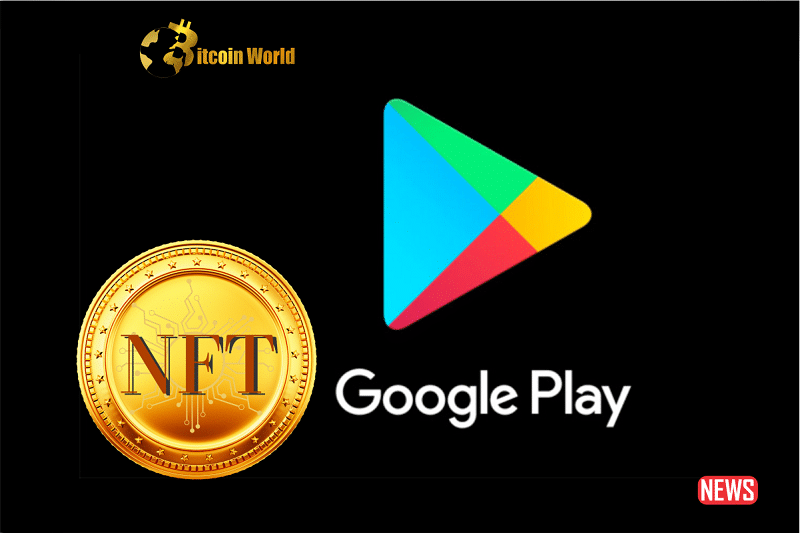Big news for the crypto-curious and gaming enthusiasts! Google has officially announced a significant shift in policy, paving the way for the integration of Non-Fungible Tokens (NFTs) into Android games and applications. This move, slated for full implementation by the end of the year, signals a growing acceptance of blockchain technology within mainstream platforms. Exciting, right?
What’s the Buzz About Google and NFTs?
For those keeping an eye on the evolving digital landscape, this announcement isn’t entirely out of the blue. However, the clarity and direction provided by Google’s new guidelines are definitely making waves. Let’s break down the key takeaways:
- Transparency is Key: Google is emphasizing clear communication with users. Developers of blockchain-based games will need to explicitly state this on their Google Play Store listing. Think of it as a badge of honor (or at least, a clear indicator!).
- NFT Utility Within Games: Imagine owning a unique sword in your favorite RPG as an NFT. Google’s policy allows these NFTs to unlock in-app content, regardless of where you initially acquired them. This is a stark contrast to Apple’s more restrictive approach and offers greater flexibility for players.
- No Glamorizing Crypto Trading: While NFTs are welcome, Google is drawing a line. Developers are prohibited from actively promoting or glorifying cryptocurrency or NFT trading within their apps. This aligns with their existing policies on real-money gambling.
- In-Game NFT Usage: Offering NFTs to players within the game is permitted, but wagering or sweepstakes involving these digital assets are not allowed. It’s about ownership and utility, not turning your game into a casino.
The Developer’s Perspective: What Does This Mean for You?
If you’re an Android game developer, this announcement opens up a world of possibilities. Here’s a quick look at the potential benefits:
- New Revenue Streams: NFTs can represent unique in-game items, characters, or even virtual land, creating new avenues for monetization beyond traditional in-app purchases.
- Enhanced Player Engagement: The ability to truly own and potentially trade in-game assets can foster a stronger sense of ownership and investment among players.
- Community Building: NFTs can facilitate the creation of exclusive communities around specific in-game assets, fostering a stronger bond between players.
- Innovation and Creativity: The integration of NFTs encourages developers to explore new game mechanics and economic models.
Potential Challenges and Considerations
Of course, with any new technology, there are challenges to consider:
- User Education: Many users are still unfamiliar with NFTs and blockchain technology. Developers will need to educate their audience about the benefits and functionalities of these digital assets.
- Gas Fees and Transaction Costs: Depending on the blockchain used, transaction fees associated with NFTs can be a barrier for some users.
- Security Concerns: Ensuring the security and integrity of NFT transactions is crucial to maintain user trust.
- Regulatory Uncertainty: The regulatory landscape surrounding cryptocurrencies and NFTs is still evolving, which could pose challenges for developers.
Google vs. Apple: A Tale of Two App Stores
Google’s approach to NFTs stands in contrast to Apple’s more cautious stance. While Apple allows the viewing of NFTs within apps, it currently restricts the unlocking of in-app content through NFTs purchased outside of the App Store ecosystem. This difference in policy could significantly impact how developers choose to integrate NFTs into their mobile games.
Let’s take a quick look at the key differences:
| Feature | Google Play Store | Apple App Store |
|---|---|---|
| Disclosure of Blockchain Game Status | Required | Not Explicitly Required |
| Unlocking In-App Content with External NFTs | Allowed | Restricted |
| Promotion of Crypto/NFT Trading | Prohibited | Generally Prohibited |
Examples of NFT Integration in Games (and What We Might See on Android)
While we’re still in the early stages of NFT integration in mobile gaming, we can look at examples from other platforms to get an idea of the possibilities:
- Collectible NFTs: Unique in-game characters, skins, or items that players can collect and trade. Think of it like digital trading cards with verifiable scarcity.
- Utility NFTs: NFTs that grant access to special in-game features, events, or content.
- Virtual Land Ownership: In metaverse-style games, NFTs can represent ownership of virtual plots of land.
- Play-to-Earn Mechanics: Games where players can earn cryptocurrency or NFTs through gameplay.
Actionable Insights for Developers
So, what should Android developers be doing now?
- Stay Informed: Keep up-to-date with Google’s evolving policies and guidelines regarding NFTs.
- Explore Blockchain Technologies: Familiarize yourself with different blockchain platforms like Ethereum and Polygon, which are commonly used for NFTs.
- Consider User Experience: Design your NFT integration in a way that is intuitive and engaging for your players, even those new to the concept.
- Prioritize Security: Implement robust security measures to protect user assets and prevent fraud.
- Engage with the Community: Talk to your players and understand their interest in NFTs and how they envision them being integrated into your game.
The Future is Tokenized?
Google’s decision to embrace NFTs in Android games and apps is a significant step towards the wider adoption of blockchain technology in the mobile ecosystem. While challenges remain, the potential benefits for both developers and players are undeniable. This move could very well usher in a new era of digital ownership and engagement within the gaming world. Are you ready to see what the future holds?
Disclaimer: The information provided is not trading advice, Bitcoinworld.co.in holds no liability for any investments made based on the information provided on this page. We strongly recommend independent research and/or consultation with a qualified professional before making any investment decisions.


